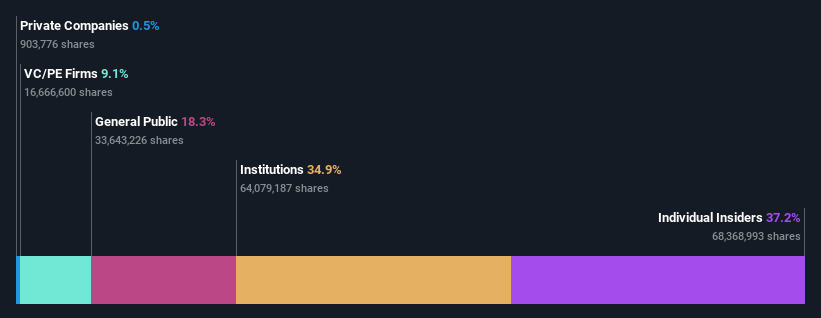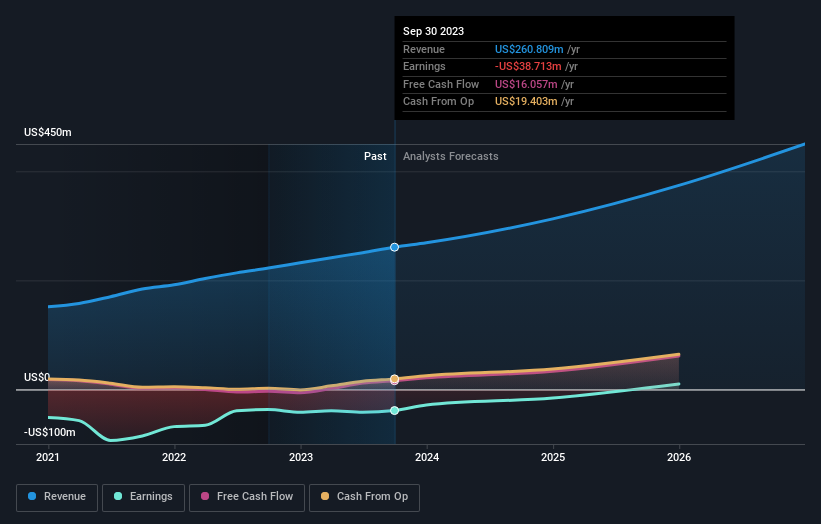With 37% ownership in AvePoint, Inc. (NASDAQ:AVPT), insiders continue to have the largest holding even though they have sold shares recently
Key Insights
AvePoint's significant insider ownership suggests inherent interests in company's expansion
A total of 6 investors have a majority stake in the company with 51% ownership
A look at the shareholders of AvePoint, Inc. (NASDAQ:AVPT) can tell us which group is most powerful. With 37% stake, individual insiders possess the maximum shares in the company. Put another way, the group faces the maximum upside potential (or downside risk).
Despite recent sales, insiders own the most shares in the company.
Let's take a closer look to see what the different types of shareholders can tell us about AvePoint.
View our latest analysis for AvePoint
What Does The Institutional Ownership Tell Us About AvePoint?
Institutions typically measure themselves against a benchmark when reporting to their own investors, so they often become more enthusiastic about a stock once it's included in a major index. We would expect most companies to have some institutions on the register, especially if they are growing.
AvePoint already has institutions on the share registry. Indeed, they own a respectable stake in the company. This suggests some credibility amongst professional investors. But we can't rely on that fact alone since institutions make bad investments sometimes, just like everyone does. When multiple institutions own a stock, there's always a risk that they are in a 'crowded trade'. When such a trade goes wrong, multiple parties may compete to sell stock fast. This risk is higher in a company without a history of growth. You can see AvePoint's historic earnings and revenue below, but keep in mind there's always more to the story.
We note that hedge funds don't have a meaningful investment in AvePoint. Zhijian Lu is currently the company's largest shareholder with 10% of shares outstanding. For context, the second largest shareholder holds about 9.5% of the shares outstanding, followed by an ownership of 9.1% by the third-largest shareholder. Xunkai Gong, who is the second-largest shareholder, also happens to hold the title of Top Key Executive. Additionally, the company's CEO Tianyi Jiang directly holds 8.6% of the total shares outstanding.
On further inspection, we found that more than half the company's shares are owned by the top 6 shareholders, suggesting that the interests of the larger shareholders are balanced out to an extent by the smaller ones.
While it makes sense to study institutional ownership data for a company, it also makes sense to study analyst sentiments to know which way the wind is blowing. Quite a few analysts cover the stock, so you could look into forecast growth quite easily.
Insider Ownership Of AvePoint
The definition of an insider can differ slightly between different countries, but members of the board of directors always count. The company management answer to the board and the latter should represent the interests of shareholders. Notably, sometimes top-level managers are on the board themselves.
Most consider insider ownership a positive because it can indicate the board is well aligned with other shareholders. However, on some occasions too much power is concentrated within this group.
It seems insiders own a significant proportion of AvePoint, Inc.. Insiders own US$556m worth of shares in the US$1.5b company. That's quite meaningful. It is good to see this level of investment. You can check here to see if those insiders have been buying recently.
General Public Ownership
The general public-- including retail investors -- own 18% stake in the company, and hence can't easily be ignored. While this group can't necessarily call the shots, it can certainly have a real influence on how the company is run.
Private Equity Ownership
With a stake of 9.1%, private equity firms could influence the AvePoint board. Some investors might be encouraged by this, since private equity are sometimes able to encourage strategies that help the market see the value in the company. Alternatively, those holders might be exiting the investment after taking it public.
Next Steps:
It's always worth thinking about the different groups who own shares in a company. But to understand AvePoint better, we need to consider many other factors. Consider risks, for instance. Every company has them, and we've spotted 1 warning sign for AvePoint you should know about.
Ultimately the future is most important. You can access this free report on analyst forecasts for the company.
NB: Figures in this article are calculated using data from the last twelve months, which refer to the 12-month period ending on the last date of the month the financial statement is dated. This may not be consistent with full year annual report figures.
Have feedback on this article? Concerned about the content? Get in touch with us directly. Alternatively, email editorial-team (at) simplywallst.com.
This article by Simply Wall St is general in nature. We provide commentary based on historical data and analyst forecasts only using an unbiased methodology and our articles are not intended to be financial advice. It does not constitute a recommendation to buy or sell any stock, and does not take account of your objectives, or your financial situation. We aim to bring you long-term focused analysis driven by fundamental data. Note that our analysis may not factor in the latest price-sensitive company announcements or qualitative material. Simply Wall St has no position in any stocks mentioned.


